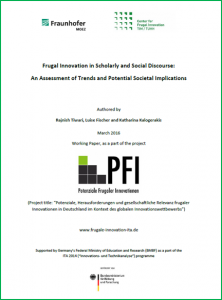 As a part of our joint BMBF-ITA project with Fraunhofer Center for International Management and Knowledge Economy (MOEZ) in Leipzig we have published a new paper to assess trends and potential societal implications of frugal innovation by analyszing scholarly and social discourse.Apart from this the paper also reports results of our workshop held in Hamburg on January 12, 2016 to assess the potentials of frugal innovation in the specific context of Germany. The publication details are as follows:
As a part of our joint BMBF-ITA project with Fraunhofer Center for International Management and Knowledge Economy (MOEZ) in Leipzig we have published a new paper to assess trends and potential societal implications of frugal innovation by analyszing scholarly and social discourse.Apart from this the paper also reports results of our workshop held in Hamburg on January 12, 2016 to assess the potentials of frugal innovation in the specific context of Germany. The publication details are as follows:
Authored by: Rajnish Tiwari a, Luise Fischer b and Katharina Kalogerakis a
a Center for Frugal Innovation, Institute for Technology and Innovation Management, Hamburg University of Technology (TUHH), Hamburg, Germany
b Fraunhofer Center for International Management and Knowledge Economy (MOEZ), Leipzig, Germany
Abstract
The topic of frugal innovation is increasingly gaining relevance in social as well as scholarly discourse. Frugal innovations have been perceived by many to be a phenomenon generally confined to emerging economies where there are large groups of unserved consumers with unmet needs. But there is increasing evidence that this phenomenon is getting relevant also in the industrialized nations potentially affecting the long-term competitiveness of domestic firms not only overseas but also at home.
 This paper has a three-fold objective: (a) It seeks to establish the theoretical antecedents of frugal innovation by examining the scholarly discourse; (b) It attempts to generate hypotheses about its long-term relevance by examining historical trends of frugality and their disappearance; (c) It seeks to comprehend the social perception of frugal innovation in the specific German context by assessing the relevant social discourse. Based upon an extensive literature review and some preliminary primary data we propose a new working definition for frugal innovation and hypothesize that frugality was a key social value with positive associations before the era of unprecedented prosperity in the industrialized world, which led to saturated markets and inter alia to feature-driven competition and over-consumption of resources. New ground realities, e.g., economic downturn in the industrialized world and the rapidly rising consumption in the economically developing world, are expected to turn frugality, once again, into an important societal value and frugal innovation into a critical success factor in mid-term future.
This paper has a three-fold objective: (a) It seeks to establish the theoretical antecedents of frugal innovation by examining the scholarly discourse; (b) It attempts to generate hypotheses about its long-term relevance by examining historical trends of frugality and their disappearance; (c) It seeks to comprehend the social perception of frugal innovation in the specific German context by assessing the relevant social discourse. Based upon an extensive literature review and some preliminary primary data we propose a new working definition for frugal innovation and hypothesize that frugality was a key social value with positive associations before the era of unprecedented prosperity in the industrialized world, which led to saturated markets and inter alia to feature-driven competition and over-consumption of resources. New ground realities, e.g., economic downturn in the industrialized world and the rapidly rising consumption in the economically developing world, are expected to turn frugality, once again, into an important societal value and frugal innovation into a critical success factor in mid-term future.
Keywords
Frugal Innovation; Frugality; Thrift; Responsible Innovation; Sustainable Growth; Competitiveness; International Business; Emerging Economies; Industrialized Nations; Germany
